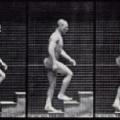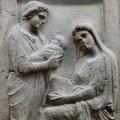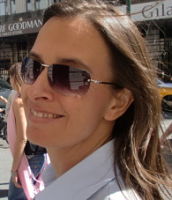28 - Fiona Leigh on Plato's Sophist
Posted on
Peter talks to Fiona Leigh of University College London about Plato's Sophist, which revises the theory of Forms to explain how falsehood is possible.
Themes:
Further Reading
• F. Leigh, "Being and Power in Plato’s Sophist," Apeiron 43 (2010), 63-85.
• F. Leigh, "The Copula and Semantic Continuity in Plato’s Sophist," Oxford Studies in Ancient Philosophy 34 (2008), 205-21.







Comments
Sound quality
Just a quick note to apologize for the background hum in this episode, which we weren't able to eliminate completely - there was a heater on in the room where the interview was done.
In reply to Sound quality by Peter Adamson
Recording clarity and forms
Thanks for mentioning the recording problem, Peter. At first I thought it was my computer. Your broadcasting voice is so regular and melodious that when you have guests I have to listen harder to make sure I understand. Also, my kudos to fellow student Dave. I think a lot about the forms. They are like a philosophical will-o-the-wisp...a haunting of my dreams as it were. The minute that I feel I have achieved some real insight it quickly dissolves into the mist and I am left grasping at thin air. Saludos, Bob
inter-relation between forms
Thanks for these podcasts.... just wanted to ask about this question of the inter-relations of the Forms (that you talk about at the end).....in the Parmenides it is explicitly stated that a person in philosophical training should look at all the major Forms (starting with the Many, Likeness, Unlikeness) and do the same analysis that Parmenides does with the One.
So one should do eight or nine different deductions on the Many starting with:- If the Many is Many..... then the Many is not One so the Many is not a Whole...etc Has anyone actually done this work? I can't find anyone....I know continental philosphers such as Sartre and Heidegger have done something with concepts like being, time and consciousness but they weren't following Parmenides programme explicitly!?
I don't think there is any way to tell in advance of doing this (difficult) work that it would be a waste of time, is there? In fact we can already see from the above that the Many is not the opposite of the One. And if we can somehow rediscover Plato's proof that the One is the same as the Good, then we can see that there is no such thing as the 'opposite' of Good, i.e Evil
All the best,
Dave
In reply to inter-relation between forms by Dave
The Many
Dear Dave,
What an interesting question! No attempt to do this springs to mind, but then, the question of what the deduction applied to the One in the Parmenides is all about is such a difficult one, that it may be unclear what it would be to produce such a deduction for another Form. Of course the Neoplatonists love the Parmenides but they do tend to think of manyness in the way you are saying we shouldn't, that is, as a failure to attain unity. So they may even think this work has been done in that the negation of unity is an indirect way of thinking about multiplicity.
As far as I know Sartre and Heidegger weren't working with this dialogue but one might think of some of the earlier German idealists, who were at least strongly influenced by the Parmenides in an indirect fashion, given that they were influenced by Neoplatonism.
Best,
Peter
In reply to The Many by Peter Adamson
Forms
Dear Peter - hope you had a good Christmas.....thanks for confirming this....it is so difficult, because I am not with an university, to get answers to questions like this...(another benefit of your podcasts is that amateurs like me get to hear how Greek words and names are pronounced - might help avoid a lot of embarrassment in the future!)
I think that Aristotle has a lot to do with it...I think that his interpretations of Plato really set the direction and tone for what has followed. Still it is fairly surprising to me that 'the history of philosophy is a set of footnotes to Plato' but that there are still so much unplumbed depth to his work! It really is an incredibly rich body of work (Complete Works of Plato), and as you say somewhere else, why would you take any other book with you on a desert island! I'd even prefer it to Shakespeare for sure.
So Aristotle brought things down to earth and people became more interested in his logic that is actually directly useful dealing with things in the phenomenal world...Plato's suggestion in the Parmenides that we should investigate the logic of the Forms in themselves, even though people will think this is a useless activity, was then somehow discredited in comparison? I don't know!
Anyway I will try to do this work and see where it takes me! It might even be that looking at deductions for other Forms might help with understanding the deduction given of the One....there is an outside chance, for example, that the deductions contain a deliberate error (or errors), put there for pedagogical purposes, that we can 'correct' once we've done other deductions!
Also this work might help me with my confusion about what an actual 'opposite' is in terms of Forms....how many kinds of 'opposites' are there (I have heard of contradictories, and contraries, but are there more?). It seems very unlikely that for an 'opposite' Form you can just reverse the logic of the deductions, so that there is a perfect symmetry. I think this will work for some deductions but not others, and in different patterns for different pairs of Forms. So One and Many might have different 'symmetries' in their deductions than Smaller / Bigger or Like / Unlike?
Another reason I might attempt this work is that I think I can see the sense of it vaguely. These Form or concepts or categories or whatever, it seems to me, are timeless and eternal in a strong sense. Wouldn’t any higher intelligence of any kind have to understand things with these concepts? Aliens, higher intelligences, gods:- they all might be unimaginably different to us but surely they would all understand what Bigger and Smaller are, or that something can be Like or Unlike something else, or that things have existence (Being) or not? We all look for stability in our lives and it seems like these inter-related Forms are universal and stable in a way nothing else is, or is there a good critique of this view out there I should know about?
I guess this post is longer and more rambling than it should be, so will stop here!!
All the best,
Dave
In reply to Forms by Dave
Greek pronunciation etc
Dear Dave,
A quick caveat about Greek pronunciation: (a) as far as I know the question of how ancient Greek was really pronounced is an insoluble one, though poetry etc give us some indication; and (b) if anyone has a "correct" pronunciation it isn't going to be me, probably what you're hearing from me is a not so educated guess! (When we get to Arabic it will be a bit better.)
Regarding the Parmenides deductions, I'm glad you're so enthusiastic -- I agree that the question of how the opposites function is a really interesting one. It may be important to bear in mind Aristotle's distinction between a contrary and a privation, so the difference between hot vs cold and hot vs not-hot (something room temperature is not hot, but also not cold).
Cheerio!
Peter
Properties? Logic!
Hey there,
Leigh keeps talking about 'properties' in Plato's 'theory of ideas'. That takes Plato in an ontological way I cannot see given in the text, apart from the fact that such a concept like 'properties' is aristotelian and not platonian. My question is: why are you reading Plato as an ontologist, esp. in the Sophist? Why not in a reflexion-logical manner? All the parts of the Sophist fit together when you read it as an ongoing reflecting back on the own usage of concepts, as the Theaitetos already did. The 'megista gene' would be just the dialectical instrument to clear up the double aporia of not-being (deriving from the Sophist's sixth/seventh definition) and being (deriving from the short 'history of philosophy' part concerning other positions) - especially from the two clearly onesided reductions of the Somatists and the Idealists, which are - as Heidegger has shown in his lecture of the Sophist from 1924 - both presupposing something which is excluded from their logos and therefore contradicting themselves. So we would have two performative or reflexive (!) contradictions here - concerning Parmenides' sentence and the 'at the same time' of movement and stillness (which is also pointing back to the model of the soul in the Theaitetos, which is also thematized later in the Sophist) - and, thus, the start of the 'megista gene', not as 'the greatest kinds' but as 'the most important concepts' (used), called 'gene' because the regard of this term lies on their actual logical regard to each other (while mia idea and eide develop other regards). And so it is just a reflexion-logical - referring back on the own operative concepts - explication of the logos as symploke (which is said several times), explicating logos as 'symploke', in the 'koinonia' of the five concepts. And then héteron is just logically presupposed, when 'héteron' is put as a genos (which is also said), and the logos is closed, by 'transcendental' argument. - You are taking Plato (and others) as ontologists, highly influenced by the already flawed view of Aristotle interpreting them. Plus: You can find the whole thing, again, reflected in the Politikos which follows the Sophist, as the Sophist follows Theaitetos (giving the answers the Theaitetos did not provide: the concept of falsity (second definition) and a proper (!) concept of logos (third definition). - Just another approach without this analyical infested metaphysics of 'properties' and 'things' and 'ontology'; just 'logon didonai': giving account for the own and the other's logos in a dialogue (as said exemplarily in Pol. 348a-b, the Nomoi and others). I wonder why so many researchers are still clinging to that oldfashioned ontology-interpretation. Thx for reading - it's just a proposal. - D.
In reply to Properties? Logic! by Daniel
Ontological reading of Sophist
I can't claim to follow everything you are saying here, but I don't think it is plausible to deny that Plato wants to talk about ontology in the Sophist. He is explicitly engaging with Parmenides and the question of what being is; that's pretty much the definition of an ontological context. But I think there is a deeper point here, which is that I would reject (in this context) the contrast you are drawing between the logical and the ontological. Plato, I think, would assume that the level of discourse is intimately bound up with the level of being, and resist your suggestion that we could think about how names function without thinking about the realities to which they correspond. Thus I think it is right that he is interested in how (Greek) words function, but precisely because this function reveals what is going on at the level of the Forms, and being more generally. Cf. the passage at the end of the first part of the Parmenides where it is said that discourse requires postulation of the Forms.
In reply to Ontological reading of Sophist by Peter Adamson
Ontology? Logic!
Thank you for your nearly immediate answer. - I think your problem of understanding my point might derive from the possibility that we don't share the same presuppositions. For example, we both don't know if what I understand with 'reflexion-logic' and 'dialectic' from Plato is not the same as you understand with the (16th century) term 'ontology'. Another example is your argument with Parmenides: one can but does not have to - as Buchheim, Rapp and Stekeler-Weithofer f.e. has shown - read Parmenides from the Aristotelian viewpoint as 'ontologist'. In fact, you can find a kinda rudimentary conceptual structure like in the Sophist also in Frg. 8 of Parmenides' poem, so it's highly depending in your translation of the logical structure of Greek conceptualization (to break it down: as logos about things or as logos about logos and the logical justification of it). Then one has also to assume that Plato interprets Parmenides - as he also does with the Sophists - and clearly critizise him in the Sophist for a performative contradiction. So perhaps we aren't even dealing with a 'authentic' Parmenidean thought here. I also don't think that it's a good idea to take the dialogues plain as containers of doxographical author-intentions, because that ignores in even many dimensions the logical work of the 'dialegesthai' and the whole pedagogy Plato sets up. As Figal has shown, the Parmenides can also be read as a critique of simple ontological presuppositions like you propose, like in the clear fallacy to reify concepts to things (third man regressus) or to separate concepts from which they are concepts (transcendental regressus). Both solutions - 'everything connects', 'nothing connects' - are set up in the Sophist - and solved by a differentation of regards by concepts: 'some connect, some don't'.
So from my point of view I find your ontological view highly unplausible when taking a look in the text (and not presupposing intentions that there are not). At last, I could find no single passage in the dialogues which supports your assumption that Plato makes such a difference between 'Levels' of thought or being, which are not already used as a myth or other purposes (f.e. in Politeia, where everything concerning this topic is uttered only in similes - which purpose and function is f.e. explained in Politikos). Perhaps you have to ask yourself if this dualism is not just a petitio principii brought into the text (and other texts, I have listened to a bunch of podcasts) by your very own regard of reading. Your project is stunning and beautiful, but it puts everything under an ontological cloak. I think this is 19th century Plato and we have the ressources to stop that infinite mystery puzzle of ontology for a more adaequate reading (and not only exegesis) of the texts. We can go into the texts directly, of you want, but maybe better per mail? I don't wanna spam your blog with my extended commentaries.
In reply to Ontology? Logic! by Daniel
Ontology
Ok, I will send you an email then.
In reply to Ontology by Peter Adamson
Interpreting the sophist
I have arrived late to the feast. Please share more of the above commentary.
Forms
Thank you, Peter, for your work here. I am new to the study of philosophy and am learning a lot. I have a question related to forms. Forgive me if this has already been addressed or if I am wildly misunderstanding forms. How can there be a form of beauty if “beauty is in the eye of the beholder”? How can there be a form of justice if justice is a thing that is argued. For instance, if two people consider the same painting and one thinks it is beautiful, but the other doesn’t, how can the form of beauty be in operation. Or if one person believes that capital punishment is just, but the other doesn’t, how can the form of justice be in operation? Or for that matter, how can there be the greatest form Good if people can’t even agree as to what is good (eg. democracy, religion, etc.)?
In reply to Forms by David Boggs
Forms
Well quite. In a way that is part of the point of the theory of Forms: Plato is pushing back against a relativist position like the one you are sketching, which in his day was defended by the sophists. He would of course agree that people have different views about justice and the good, but that is only because some (most) of them are laboring under false beliefs on these topics.
Add new comment